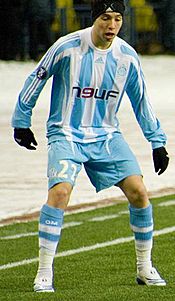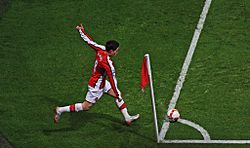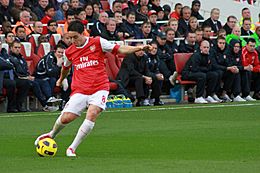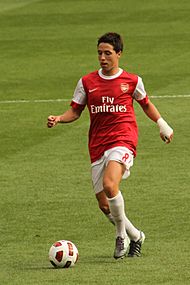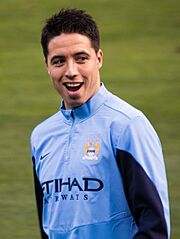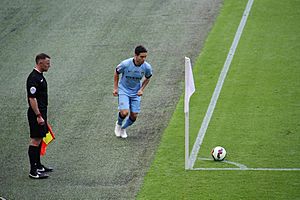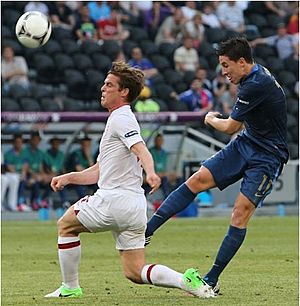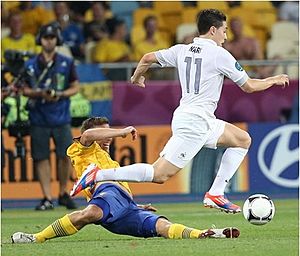Samir Nasri facts for kids
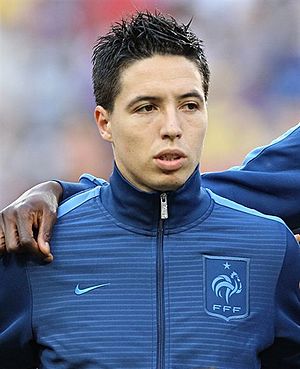
Nasri with France in 2012
|
|||
| Personal information | |||
|---|---|---|---|
| Full name | Samir Nasri | ||
| Date of birth | 26 June 1987 | ||
| Place of birth | Septèmes-les-Vallons, France | ||
| Height | 1.75 m (5 ft 9 in) | ||
| Position(s) | Attacking midfielder | ||
| Youth career | |||
| 1995–1997 | Pennes Mirabeau | ||
| 1997–2004 | Marseille | ||
| Senior career* | |||
| Years | Team | Apps | (Gls) |
| 2004–2008 | Marseille | 121 | (11) |
| 2008–2011 | Arsenal | 86 | (18) |
| 2011–2017 | Manchester City | 129 | (18) |
| 2016–2017 | → Sevilla (loan) | 23 | (2) |
| 2017–2018 | Antalyaspor | 8 | (2) |
| 2019 | West Ham United | 5 | (0) |
| 2019–2020 | Anderlecht | 7 | (1) |
| Total | 379 | (52) | |
| International career | |||
| 2002–2003 | France U16 | 16 | (8) |
| 2003–2004 | France U17 | 16 | (6) |
| 2004–2005 | France U18 | 4 | (0) |
| 2005–2006 | France U19 | 10 | (5) |
| 2006–2007 | France U21 | 4 | (0) |
| 2007–2013 | France | 41 | (5) |
| *Club domestic league appearances and goals | |||
Samir Nasri (born June 26, 1987) is a French former professional footballer. He mostly played as an attacking midfielder or a winger. Sometimes, he also played in the middle of the field. Nasri was known for his amazing dribbling, great ball control, and excellent passing. People often compared his playing style to the famous French player Zinedine Zidane.
Nasri started his football journey playing for youth clubs in his hometown of Marseille. When he was nine, he joined the professional club Olympique de Marseille. He spent seven years learning and growing in their youth academy. In the 2004–05 season, he made his first professional appearance in September 2004. He was only 17 years old at the time. In the next season, he became a regular player and competed in European competitions for the first time. In the 2006–07 season, Nasri won the National Union of Professional Footballers (UNFP) Young Player of the Year award. He was also chosen for the Team of the Year. He played over 160 games for Marseille. He helped his team reach the Coupe de France finals in 2006 and 2007.
In June 2008, Nasri joined Premier League club Arsenal. He signed a four-year contract. He became very well-known in his third season with Arsenal. He won the Professional Footballers' Association (PFA) Fans' Player of the Month award three times. He was also named to the PFA Team of the Year. In December 2010, he was named the French Player of the Year. In August 2011, after three seasons with Arsenal, Nasri moved to Manchester City. He signed a four-year contract there. In his first season with Manchester City, he won his first major trophy. The club won the 2011–12 Premier League. He played 176 games for Manchester City and scored 27 goals. He won another Premier League title and the Football League Cup in 2014. After a loan to Sevilla in 2016, he played for Antalyaspor, West Ham United, and Anderlecht. He retired from football in 2021.
Nasri played for France's youth teams at every level. Before joining the senior team, he played for the under-17 team. This team won the 2004 UEFA European Under-17 Championship. Nasri made his first senior international appearance in March 2007. This was in a friendly match against Austria. He scored his first senior international goal two months later. This was in a 1–0 win against Georgia during UEFA Euro 2008 qualifying. He played 41 games for France and scored five goals. He represented his country at UEFA Euro 2008 and Euro 2012. He stopped playing for the national team after not being chosen for the 2014 FIFA World Cup.
Contents
Early Life and Football Beginnings
Nasri was born in Septèmes-les-Vallons, a town near Marseille, France. His parents were French but had family from Algeria. His mother, Ouassila Ben Saïd, and father, Abdelhafid Nasri, were both born in France. His father grew up in Marseille. His mother was from nearby Salon-de-Provence. Nasri's grandparents moved to France from Algeria. His mother was a housewife, and his father worked as a bus driver. Later, his father became his manager.
When he started playing football, Nasri first used his mother's last name, Ben Saïd. He later switched to Nasri, his father's last name. This happened after he was chosen for the France under-16 team. Samir is the oldest of four children. He has a younger sister named Sonia and twin brothers named Walid and Malik. All four grew up in La Gavotte Peyret. When he joined Arsenal in England, Nasri lived in Hampstead, a part of North London. His cousin, Kaïs Nasri, is also a professional footballer.
Learning to Play on the Streets
Growing up in La Gavotte Peyret, Nasri often played football on the streets. This is where he learned many of his skills. His parents saw his great talent and signed him up for the local club in his hometown. Nasri played for one year with the club in La Gavotte Peyret. Then, at age seven, he moved to Pennes Mirabeau in nearby Mirabeau.
While playing with Pennes, a scout from Marseille, Freddy Assolen, noticed Nasri. The scout had heard about his talent from people in the area. After seeing Nasri play, Assolen invited him to travel to Italy. There, Nasri and other young players would play in a youth tournament against teams like Milan and Juventus. Nasri played very well at the tournament. A Milan scout even joked that Nasri should stay with them. After returning to France, Marseille officials met with Nasri's father. They agreed for Nasri to join the club's academy when he was nine years old.
Club Career Highlights
Joining Olympique de Marseille
When Nasri joined the Marseille youth academy, he quickly impressed everyone. His playing style really started to develop when he moved to Bastide, where the club's young players lived. In 2007, Nasri said that moving to Bastide truly helped his game. He mentioned that the training was different and the facilities were excellent, which helped him work well.
Because he improved so quickly, Nasri was a key player on every youth team he joined. He won several trophies, like the Championnat de Provence. After playing most of the 2003–04 season with the club's under-18 team, the 16-year-old Nasri moved up. He joined the club's reserve team in the Championnat de France amateur, which is the fourth division of French football. He mostly played as a substitute in a few games that season.
Making His Professional Debut
Before the 2004–05 season, many clubs wanted to sign Nasri. These included English clubs like Arsenal, Chelsea, and Liverpool. To stop the rumors, Marseille offered Nasri a three-year professional contract. He agreed to the contract on August 13, 2004. Marseille wanted to sign him so they wouldn't lose him without getting any money, like they did with another player, Mathieu Flamini.
Because he signed a professional contract, Nasri was promoted to the senior team. He was given the number 22 shirt. He started the season playing for the reserve team. In September 2004, he was called up to the senior team. Nasri made his professional debut on September 12 in a 2–0 loss to Sochaux. He came in as a substitute. On October 17, he started his first professional game. He played the whole match in a 1–1 draw with Saint-Étienne. Nasri played a lot for the team. He scored his first professional goal in January 2005. It was in a 2–1 win against Lille. He finished his first season with 25 games played, one goal, and two assists.
Becoming a Regular Player
The 2005–06 season saw new players join Marseille, like Franck Ribéry and Djibril Cissé. Nasri was given a bigger role by the new manager, Jean Fernandez. He played well with Ribéry, Cissé, and striker Mamadou Niang. He played in 49 games in total, including matches in the UEFA Cup and the UEFA Intertoto Cup. Nasri played his first European game on July 16, 2005. Marseille won the 2005 UEFA Intertoto Cup after beating Deportivo de La Coruña. In the league, Nasri played in 30 matches, starting 25 of them. He scored his only league goal of the season on April 29, 2007, in a 4–2 win over Sochaux.
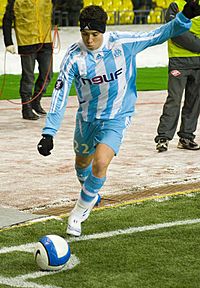
In the Coupe de France, Nasri played in five matches. Marseille reached the final, where they played against rivals Paris Saint-Germain. Nasri came on as a substitute, but Marseille lost 2–1. After the season, Nasri signed a two-year contract extension until 2009.
Award-Winning Season
Nasri started the 2006–07 season with a new manager, Albert Emon. Many people thought Marseille would finally win their first league title since 1991–92. Nasri started the season well, scoring a goal in the team's 3–1 win over Paris Saint-Germain in September 2006. On April 29, 2007, Nasri scored in Marseille's 4–2 win over Sochaux. Days later, Marseille faced Sochaux again in the 2007 Coupe de France Final. Marseille was expected to win, but Sochaux won 5–4 on penalties after the game ended 2–2.
On the last day of the season, Nasri scored the only goal in a 1–0 win over Sedan. This win secured second place for Marseille. It was their best finish since the 1998–99 season. Nasri played a career-high 50 games that season, with 37 in the league. For his great play, he won the UNFP Young Player of the Year award. He was also named to the Team of the Year. Fans also voted Nasri as the Club Player of the Year.
Leading the Attack
For the 2007–08 season, Nasri had another new manager, Eric Gerets. With Franck Ribéry gone, Gerets made Nasri the main player in the attack. Nasri had his best season at the club. He played in 42 games, scoring a career-high six goals and assisting 15 goals. Nasri worked well with midfielders like Mathieu Valbuena, Lorik Cana, and Benoît Cheyrou. Marseille had the third-best attack in the league.
Nasri struggled a bit at the start of the season due to a sprained ankle. He didn't score or assist in the first eight league games. On November 24, 2007, he assisted two goals in a 2–0 win over Metz. After the winter break, Nasri started scoring more. In late January, he scored in back-to-back games against Nancy and Caen. Nasri played in the UEFA Champions League for the first time. Marseille finished third in their group, which meant they played in the UEFA Cup. They lost in the round of 16 to Zenit Saint Petersburg. Nasri assisted two goals in the first leg. On March 16, 2008, Nasri scored in a 3–3 draw with Lens. A month later, he scored the winning goal in a 2–1 victory over Metz. In his last game for Marseille, against Strasbourg, Nasri scored a goal and assisted another in a 4–3 win. Marseille finished third in the league, qualifying for the Champions League again. On May 8, 2008, Nasri signed a new three-year contract with the club until 2012.
Moving to Arsenal
First Season in England
One week after signing his new contract with Marseille, Nasri was linked with a move to Premier League club Arsenal. Arsenal manager Arsène Wenger had been watching Nasri since the 2004 UEFA European Under-17 Championship. It was later revealed that Nasri's contract extension was to help Marseille get a higher transfer fee for him. Marseille wanted about £14 million for the young midfielder. Before UEFA Euro 2008, both Nasri's agent and Wenger said that offers were made and a move to Arsenal was likely. The deal was completed on July 11, 2008. Nasri signed a four-year contract. The transfer fee was not officially announced, but it was thought to be around £12 million. Nasri said that Wenger was a main reason he joined Arsenal. He felt Wenger gave young players great chances and was one of the best managers.
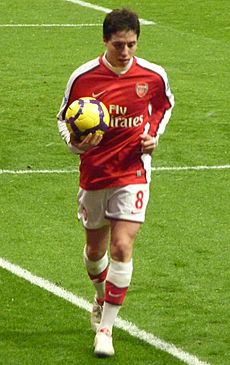
Nasri was given the number 8 shirt. He made his club debut on July 30, 2008, in a friendly match against German club VfB Stuttgart. Arsenal won 3–1. He made his Premier League debut on August 16 against West Bromwich Albion. In that match, Nasri scored his first league goal after just four minutes, helping Arsenal win 1–0. This made him the 83rd player in Premier League history to score on his debut. On August 27, Nasri scored his second goal for Arsenal in a Champions League qualifying match against Twente. Arsenal won 4–0. On November 8, Nasri scored both of Arsenal's goals in a 2–1 win over Manchester United.
On December 21, Nasri assisted the first goal scored by Robin van Persie in a 1–1 draw with Liverpool. Nasri started scoring again in the new year. On January 17, 2009, he scored the second goal in a 3–1 win over Hull City. Two months later, he scored another goal in Arsenal's 3–1 away win against Newcastle United. He finished his first season at Arsenal playing in 44 matches, scoring seven goals, and providing five assists.
Overcoming Injury
On July 21, 2009, during a pre-season training match with Arsenal, Nasri broke his leg. This injury meant he needed two to three months of rest. As a result, Nasri missed the start of the 2009–10 Premier League season. He made his return on October 25, 2009, in a League Cup game against Liverpool. Nasri played the whole match in a 2–1 win. On November 4, he scored his first goal of the season in a Champions League group stage match against AZ. Three weeks later, Nasri scored another Champions League goal against Standard Liège in a 2–0 win. He played a lot for the team during the winter months. He ended 2009 by scoring a goal and assisting another in a 4–1 win over Portsmouth.
After almost two months without scoring, Nasri scored an impressive goal in Arsenal's 5–0 win over Porto in the Champions League knockout stage. This goal showed Nasri's great dribbling skills. He received the ball, dribbled past three Porto players, and then shot the ball into the net. Three weeks later, Nasri scored the first goal against Birmingham City. Birmingham later scored to make it a draw. This draw ended Arsenal's run of seven straight league wins. In the team's last seven league matches, Nasri assisted goals in a 3–2 loss to Wigan Athletic and a 4–0 win over Fulham. Arsenal finished the season in third place. Nasri ended his second season at Arsenal with 34 matches played, five goals, and five assists.
A Standout Season
Before the 2010–11 season, Nasri wanted to get back to his best form. He was disappointed about not being chosen for the 2010 FIFA World Cup. However, after talking to Arsène Wenger, he felt better and used it as motivation. Nasri started the season well. He played in Arsenal's first match against Liverpool on August 15, 2010, which was a 1–1 draw. After the match, Arsenal said Nasri had a knee injury. But he returned quickly and helped Arsenal beat Braga 6–0 in the Champions League. On September 21, he scored two goals in a 4–1 win over rivals Tottenham Hotspur. Both goals were from penalty kicks. Four days later, Nasri scored another two goals in a 3–2 loss to West Bromwich Albion.
Nasri continued his excellent form. In October 2010, he scored in three straight matches. He scored a penalty in a 2–1 win over Birmingham City. In the next game, against Shakhtar Donetsk, Nasri scored a left-footed goal in a 5–1 victory. He also assisted a goal in that match. Five days later, against Manchester City, he scored the first goal and helped set up the third in a 3–0 win. Because of his great performances in October, Nasri was named the PFA Fans' Player of the Month. In November, Nasri scored again in a 3–2 loss to Tottenham. A week later, he scored in a 4–2 win over Aston Villa.
On December 4, Nasri scored two goals against Fulham, giving Arsenal a 2–1 win. This victory put Arsenal at the top of the league table. These were his seventh and eighth league goals, and his tenth and eleventh overall. Four days later, Nasri scored in Arsenal's important Champions League match against Partizan, a 3–1 win. On December 13, Nasri was named the France Football French Player of the Year for his performances in 2010. He was the first Arsenal player to win this award since Thierry Henry in 2006. Nasri also won the Fans' Player of the Month award for December and January.
Nasri scored his 13th goal of the season in a 3–0 win against Birmingham City on January 1, 2011. In the FA Cup, Nasri scored his first goal in the competition in a 3–1 win over Leeds United. On January 30, Nasri had to leave an FA Cup game due to a hamstring injury. He missed two weeks but returned for the Champions League match against Barcelona. In the first game, Nasri assisted the winning goal scored by Andrey Arshavin. Arsenal won 2–1, but lost the overall tie 4–3. On April 8, Nasri was nominated for both the PFA Players' Player of the Year and PFA Young Player of the Year awards. He didn't win either, but he was chosen for the PFA Team of the Year.
Nasri greatly admired his former manager Wenger, calling him a "role model" and a "magician." In total, Nasri scored 27 goals in 124 games for Arsenal.
Success at Manchester City
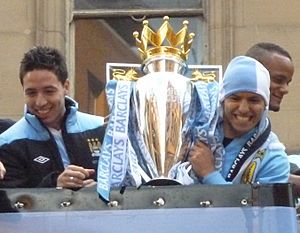
On August 24, 2011, it was confirmed that Nasri had joined Manchester City. The transfer fee was around £25 million, and he signed a four-year contract.
Winning the Premier League
Nasri made his debut for Manchester City on August 28 in a league game against Tottenham Hotspur. In that match, he assisted three goals as Manchester City won 5–1. In the team's next game, Nasri assisted one of Sergio Agüero's goals in a 3–0 win over Wigan Athletic. On October 1, he scored his first goal for the club in a 4–0 victory, also assisting two other goals. On December 3, Nasri scored his second goal for Manchester City from a free-kick in a 5–1 win against Norwich City. The next month, Nasri scored his third goal in a 3–2 win against Tottenham. On March 21, 2012, he scored the winning goal in a 2–1 win over Chelsea. On April 22, he scored in a 2–0 away win against Wolverhampton Wanderers. On May 13, Nasri won his first Premier League trophy. Manchester City became champions for the 2011–12 season after beating Queens Park Rangers 3–2.
More Trophies and Awards
At the start of the 2012–13 season, Nasri changed his shirt number from 19 to 8. On August 12, he scored and assisted a goal in the 2012 Community Shield. Manchester City won 3–2 against Chelsea. A week later, on the first day of the 2012–13 Premier League, he scored and assisted again in a 3–2 win against Southampton. He then scored against Ajax in a Champions League group stage match. In March 2013, after a great performance in a 4–0 win against Newcastle United, Manchester City manager Roberto Mancini joked about Nasri's inconsistent form. On April 14, Nasri scored the first goal as City defeated Chelsea 2–1 in the FA Cup semi-final.
Nasri scored his first goal of the 2013–14 season in a 4–1 win against Manchester United. On November 5, he assisted goals by Sergio Agüero and Álvaro Negredo. City won 5–2 against CSKA Moscow and reached the knockout stages of the Champions League for the first time. On December 1, Nasri scored twice in a 3–0 win over Swansea City.
On March 2, 2014, Nasri scored the second goal as Manchester City defeated Sunderland 3–1 to win the 2014 League Cup final. For his performance in the final, Nasri received the Alan Hardaker Trophy, given to the Man of the Match.
In a very important Premier League match against Everton on May 3, Nasri assisted Edin Džeko's winning goal. City came from behind to win 3–2 and went to the top of the league table. On May 11, Nasri scored Manchester City's first goal in a 2–0 win over West Ham United. This helped the club win the 2013–14 Premier League title.
Later Years at City and Loans
Nasri signed a new five-year contract with Manchester City on July 10, 2014. This kept him at the club until 2017. On November 22, 2015, manager Manuel Pellegrini confirmed Nasri would miss four to five months due to a tendon injury. On April 10, 2016, in his first game back from injury, he scored the winning goal against West Bromwich Albion. Manchester City won 2–1.
On August 31, 2016, Nasri joined Spanish club Sevilla on a loan for the season. He made his debut in La Liga nine days later in a 2–1 win over Las Palmas. He played very well, completing over 90% of his passes. Nasri played 30 games and scored three goals for Sevilla. He scored the only goal in a Champions League group win against Dinamo Zagreb.
Short Stays and Retirement
On August 21, 2017, Nasri signed a two-year contract with Turkish team Antalyaspor. The transfer fee was reported to be €3.5 million. On January 31, 2018, Nasri ended his contract with the club. He had played eight games and scored two goals in the Süper Lig during his five months there.
With his time away from football ending on December 31, 2018, Nasri began training with West Ham United. He hoped to sign a short-term contract. When he was able to play again, Nasri signed a deal with West Ham until the end of the 2018–19 season. In May 2019, West Ham announced that Nasri would leave the club in June 2019.
On July 5, 2019, Nasri signed with Belgian club Anderlecht for free. He was signed by their new player-manager, his former Manchester City captain Vincent Kompany. Nasri made his debut for Anderlecht on July 28. The season started with a 2–1 loss to Oostende. On August 17, he scored his first goal in a 4–2 loss at Kortrijk. On September 25, he scored in a 3–2 win against Beerschot in the Belgian Cup. From October, he had some injuries. In April 2020, Nasri left Anderlecht. He had played eight games and scored two goals. In September 2021, he announced that he had retired from professional football.
International Career
Youth Team Success
Nasri played for all of France's youth teams. He was part of a special group of players born in 1987, which included Hatem Ben Arfa, Karim Benzema, and Jérémy Ménez. With the under-16 team, Nasri played 16 games and scored eight goals. He was the first of the four players to become a regular starter. He scored his first goal for the team on October 29. On December 11, Nasri scored the first goal in a 6–1 win over Greece. At the 2003 Aegean Cup, he scored two goals as France finished third.
At the under-17 level, Nasri, Menez, and Ben Arfa were joined by Karim Benzema. Their goal was to win the 2004 UEFA European Under-17 Championship in France. Nasri scored in the first game against Sweden, a 5–2 win. At the 2004 UEFA European Under-17 Championship, Nasri scored against Portugal in the semi-finals. France won 3–1 to reach the final. In the final, France played Spain. Nasri scored the winning goal, giving France its first title in the competition. In total, he played 16 games and scored six goals for the under-17 team.
The group of Nasri, Ben Arfa, Benzema, and Ménez played together again for the under-19 team. They wanted to win the 2006 UEFA European Under-19 Championship. Nasri scored two goals in friendly matches against Norway. In the qualification round, Nasri assisted two goals in a 3–1 win over Wales. He also scored in a 3–0 win over San Marino. In the final group match against Austria, Nasri scored the first goal and assisted a Benzema goal in a 2–0 win.
Playing for the Senior Team
On March 15, 2007, Nasri was called up to the senior team for the first time. This was for a UEFA Euro 2008 qualifying match and a friendly. Nasri said he was "very happy and very proud" to be called up. He made his international debut on March 28 against Austria at age 19. He started the match and helped create the only goal. Nasri returned to the team in June. On June 6, he scored his first international goal in a 1–0 Euro qualifying win over Georgia.
On November 16, 2007, Nasri scored his second international goal in a friendly match against Morocco. Because of his good performances, he was chosen for the 23-man squad for Euro 2008. Nasri made his tournament debut on June 9, 2008, against Romania. He came on as a substitute. He also played in the final group stage match against Italy.
In the 2008–09 season, Nasri played only three matches for the national team. After playing against Lithuania on March 28, 2009, he didn't play for the national team for almost a year and a half. During the 2009–10 season, Nasri was worried about his chances of playing in the 2010 FIFA World Cup. In the end, he was not chosen for the 23-man squad or even the preliminary squad.
Nasri returned to the national team under new coach Laurent Blanc for a friendly against Norway on August 11, 2010. He missed the September call-ups due to injury. He returned in October for Euro 2012 qualifying matches. On March 25, 2011, Nasri was captain of the national team for the first time. This was in a 2–0 Euro qualification win over Luxembourg. He assisted the first goal scored by Philippe Mexès. In the team's final Euro qualifier against Bosnia and Herzegovina, Nasri scored the equalizing goal from a penalty in a 1–1 draw. This draw secured a spot for France in Euro 2012. On May 29, 2012, Nasri was named to the squad for the competition. In the first group stage match against England, he scored the equalizing goal in a 1–1 draw.
After France lost to Spain in the quarter-finals, Nasri had a disagreement with a reporter. For this and other actions, the French Football Federation (FFF) gave him a three-match international ban. On May 13, 2014, France manager Didier Deschamps announced his squad for the 2014 World Cup, and Nasri was not included. On August 9, 2014, at age 27, Nasri decided to retire from international football.
How Samir Nasri Played
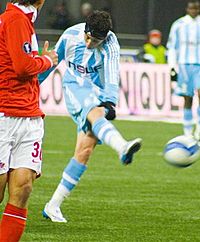
In his early years at Marseille, Nasri played in different positions. He often played as a deep-lying midfielder or a wide midfielder on the right side. People thought he was too small to play in the middle. After two years of getting stronger, in the 2006–07 season, manager Albert Emon put Nasri in the playmaker role. This position suited his vision, passing, technical skill, and ability to understand the game. Since then, Nasri mostly played in this role or as a central attacking midfielder for both his clubs and the national team. He personally preferred playing in the center.
Because he could play in many positions, Nasri also played on the wing. He spent most of his time at Arsenal playing on the wing in their 4–3–3 formation. His close control of the ball, speed, dribbling, crossing, and ability to use both feet made him good for this position. Former manager Arsène Wenger often used Nasri in this role. Nasri also played in the center for Arsenal when their captain Cesc Fàbregas was not playing.
In 2009, to make room for Russian player Andrey Arshavin, Wenger and then-France coach Raymond Domenech suggested Nasri go back to playing as a deep-lying midfielder. This was to show his good defensive skills, which were sometimes overlooked. Nasri was also good at taking direct free kicks and penalty kicks. Wenger described Nasri as a "young, quick and technically outstanding player." Club scout Gilles Grimandi also said Nasri was "a fantastic athlete, he's quick, flexible and good with his feet." Nasri's playing style and background led to comparisons with Zinedine Zidane. After he joined Arsenal and played well on the wing, the English media started comparing him to former club player Robert Pires.
Career Statistics
Club Appearances
| Club | Season | League | National cup | League cup | Europe | Other | Total | |||||||
|---|---|---|---|---|---|---|---|---|---|---|---|---|---|---|
| Division | Apps | Goals | Apps | Goals | Apps | Goals | Apps | Goals | Apps | Goals | Apps | Goals | ||
| Marseille | 2004–05 | Ligue 1 | 24 | 1 | 1 | 0 | 0 | 0 | — | — | 25 | 1 | ||
| 2005–06 | Ligue 1 | 30 | 1 | 5 | 0 | 0 | 0 | 14 | 1 | — | 49 | 2 | ||
| 2006–07 | Ligue 1 | 37 | 3 | 6 | 0 | 1 | 0 | 6 | 0 | — | 50 | 3 | ||
| 2007–08 | Ligue 1 | 30 | 6 | 2 | 0 | 2 | 0 | 8 | 0 | — | 42 | 6 | ||
| Total | 121 | 11 | 14 | 0 | 3 | 0 | 28 | 1 | — | 166 | 12 | |||
| Arsenal | 2008–09 | Premier League | 29 | 6 | 5 | 0 | 0 | 0 | 10 | 1 | — | 44 | 7 | |
| 2009–10 | Premier League | 26 | 2 | 1 | 0 | 1 | 0 | 6 | 3 | — | 34 | 5 | ||
| 2010–11 | Premier League | 30 | 10 | 4 | 1 | 4 | 2 | 8 | 2 | — | 46 | 15 | ||
| 2011–12 | Premier League | 1 | 0 | 0 | 0 | 0 | 0 | 0 | 0 | — | 1 | 0 | ||
| Total | 86 | 18 | 10 | 1 | 5 | 2 | 24 | 6 | — | 125 | 27 | |||
| Manchester City | 2011–12 | Premier League | 31 | 5 | 1 | 0 | 4 | 1 | 10 | 0 | — | 46 | 6 | |
| 2012–13 | Premier League | 27 | 2 | 3 | 1 | 0 | 0 | 6 | 1 | 1 | 1 | 37 | 5 | |
| 2013–14 | Premier League | 34 | 7 | 2 | 2 | 3 | 1 | 7 | 1 | — | 46 | 11 | ||
| 2014–15 | Premier League | 24 | 2 | 1 | 0 | 1 | 0 | 6 | 1 | 1 | 0 | 33 | 3 | |
| 2015–16 | Premier League | 12 | 2 | 0 | 0 | 0 | 0 | 1 | 0 | — | 13 | 2 | ||
| 2016–17 | Premier League | 1 | 0 | 0 | 0 | 0 | 0 | 0 | 0 | — | 1 | 0 | ||
| Total | 129 | 18 | 7 | 3 | 8 | 2 | 30 | 3 | 2 | 1 | 176 | 27 | ||
| Sevilla (loan) | 2016–17 | La Liga | 23 | 2 | 2 | 0 | — | 5 | 1 | — | 30 | 3 | ||
| Antalyaspor | 2017–18 | Süper Lig | 8 | 2 | 0 | 0 | — | — | — | 8 | 2 | |||
| West Ham United | 2018–19 | Premier League | 5 | 0 | 1 | 0 | 0 | 0 | — | — | 6 | 0 | ||
| Anderlecht | 2019–20 | Belgian Pro League | 7 | 1 | 1 | 1 | — | — | — | 8 | 2 | |||
| Career total | 379 | 52 | 35 | 5 | 16 | 4 | 87 | 11 | 2 | 1 | 519 | 73 | ||
International Appearances
| National team | Year | Apps | Goals |
|---|---|---|---|
| France | 2007 | 7 | 2 |
| 2008 | 7 | 0 | |
| 2009 | 1 | 0 | |
| 2010 | 4 | 0 | |
| 2011 | 8 | 1 | |
| 2012 | 8 | 1 | |
| 2013 | 6 | 1 | |
| Total | 41 | 5 | |
- Scores and results list France's goal tally first, score column indicates score after each Nasri goal.
| No. | Date | Venue | Opponent | Score | Result | Competition |
|---|---|---|---|---|---|---|
| 1 | 6 June 2007 | Stade de l'Abbé Deschamps, Auxerre, France |
|
|
UEFA Euro 2008 qualification | |
| 2 | 16 November 2007 | Stade de France, Saint-Denis, France |
|
|
Friendly | |
| 3 | 11 October 2011 | Stade de France, Saint-Denis, France |
|
|
UEFA Euro 2012 qualification | |
| 4 | 11 June 2012 | Donbas Arena, Donetsk, Ukraine |
|
|
UEFA Euro 2012 | |
| 5 | 10 September 2013 | Central Stadium, Gomel, Belarus |
|
|
2014 FIFA World Cup qualification |
Honours and Awards
Marseille
- UEFA Intertoto Cup: 2005
Arsenal
- Football League Cup runner-up: 2010–11
Manchester City
- Premier League: 2011–12, 2013–14
- Football League Cup: 2013–14
- FA Community Shield: 2012
- FA Cup runner-up: 2012–13
France U17
- UEFA European Under-17 Championship: 2004
Individual Awards
- UNFP Ligue 1 Young Player of the Year: 2006–07
- UNFP Ligue 1 Team of the Year: 2006–07
- Premier League Player of the Month: December 2010
- French Player of the Year: 2010
- PFA Fans' Player of the Month: October 2010, December 2010, January 2011
- PFA Team of the Year: 2010–11 Premier League
- Nominated for the Best at Sport award at the British Muslim Awards: 2013
- Alan Hardaker Trophy: 2014
See also
 In Spanish: Samir Nasri para niños
In Spanish: Samir Nasri para niños


